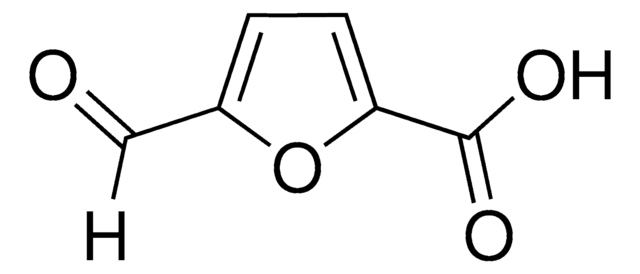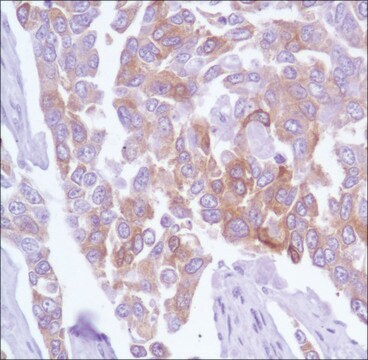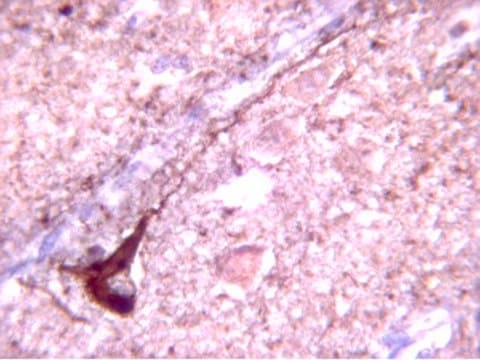AB9674
Anti-Tau phospho Serine 199/202 Antibody
Chemicon®, from rabbit
别名:
Anti-Anti-DDPAC, Anti-Anti-FTDP-17, Anti-Anti-MAPTL, Anti-Anti-MSTD, Anti-Anti-MTBT1, Anti-Anti-MTBT2, Anti-Anti-PPND, Anti-Anti-PPP1R103, Anti-Anti-TAU, Anti-Anti-tau-40
登录查看公司和协议定价
所有图片(1)
About This Item
分類程式碼代碼:
12352203
eCl@ss:
32160702
NACRES:
NA.41
推荐产品
生物源
rabbit
品質等級
抗體表格
affinity purified immunoglobulin
抗體產品種類
primary antibodies
無性繁殖
polyclonal
純化經由
affinity chromatography
物種活性
human
製造商/商標名
Chemicon®
技術
western blot: suitable
UniProt登錄號
運輸包裝
dry ice
目標翻譯後修改
phosphorylation (pSer199/pSer202)
基因資訊
human ... MAPT(4137)
一般說明
Tau is a neuronal microtubule-associated protein found predominantly on axons and functions to promote tubulin polymerization and stabilize microtubules. Tau, in its hyperphosphorylated form, is the major component of paired helical filaments (PHF), the building block of neurofibrillary lesions in Alzheimer′s disease (AD) brain. Hyperphosphorylated Tau is also found in neurofibrillary lesions in a range of other central nervous system disorders. Hyperphosphorylation impairs the microtubule binding function of Tau, resulting in the destabilization of microtubules in AD brains, ultimately leading to the degeneration of the affected neurons. Numerous serine/threonine kinases, including GSK-3beta, protein kinase A (PKA), cyclin-dependent kinase 5 (cdk5) and casein kinase II (CK2), phosphorylate Tau. Serines 199 and 202 are phosphorylated by GSK-3beta and have been linked to hereditary frontotemporal dementia. Serine 202 phosphorylation by cdk5, stimulated by the presence of microtubules, has been linked to hereditary neurodegenerative disease.
特異性
Tau phosphoSerine 199/202. The antibody recognizes Tau pSerine 199/202 in samples of recombinant human Tau treated with GSK-3beta for 45 minutes. The reactivity of the antibody is blocked with the pSerine 199/202 peptide but not the non-phosphopeptide, tau phosphopeptide corresponding to pSerine 199, tau phosphopeptide corresponding to pSerine 202 or a generic phosphoSerine-containing peptide.
免疫原
Synthetic peptide of amino acids surrounding the phosphoSerine 199 and 202 sites of human Tau.
應用
Detect Tau phospho Serine 199/202 using this Anti-Tau phospho Serine 199/202 Antibody validated for use in WB.
Research Category
Neuroscience
Neuroscience
Research Sub Category
Neurodegenerative Diseases
Neurodegenerative Diseases
Western blot: 1:1,000. Suggested blocking buffer is 5% BSA-TBST overnight at 2-8°C. Suggested antibody dilution buffer is 3% BSA-TBST. Suggested antibody incubation time is 2 hours at room temperature.
Optimal working dilutions must be determined by the end user.
Optimal working dilutions must be determined by the end user.
儲存和穩定性
Maintain at -20°C in undiluted for up to 6 months after date of receipt. Avoid repeated freeze/thaw cycles. Do not store in a self defrosting freezer.
法律資訊
CHEMICON is a registered trademark of Merck KGaA, Darmstadt, Germany
免責聲明
Unless otherwise stated in our catalog or other company documentation accompanying the product(s), our products are intended for research use only and are not to be used for any other purpose, which includes but is not limited to, unauthorized commercial uses, in vitro diagnostic uses, ex vivo or in vivo therapeutic uses or any type of consumption or application to humans or animals.
Not finding the right product?
Try our 产品选型工具.
儲存類別代碼
10 - Combustible liquids
水污染物質分類(WGK)
WGK 2
Siranjeevi Nagaraj et al.
International journal of molecular sciences, 22(7) (2021-05-01)
MicroRNAs have been demonstrated as key regulators of gene expression in the etiology of a range of diseases including Alzheimer's disease (AD). Recently, we identified miR-483-5p as the most upregulated miRNA amongst a panel of miRNAs in blood plasma specific
Alexandra Marquez et al.
Neurobiology of disease, 151, 105273-105273 (2021-01-23)
Pathological hyperphosphorylated tau is a key feature of Alzheimer's disease (AD) and Frontotemporal dementia (FTD). Using transgenic mice overexpressing human non-mutated tau (htau mice), we assessed the contribution of tau to peripheral and central neurodegeneration. Indices of peripheral small and
Fangfang Qi et al.
Molecular psychiatry (2023-06-07)
Activation of innate immunity in the brain is a prominent feature of Alzheimer's disease (AD). The present study investigated the regulation of innate immunity by wild-type serum injection in a transgenic AD mouse model. We found that treatment with wild-type
Norimichi Shirafuji et al.
International journal of molecular sciences, 19(3) (2018-03-23)
Increased plasma homocysteinemia is considered a risk factor of dementia, including Alzheimer's disease (AD) and vascular dementia. However, the reason elevated plasma homocysteinemia increases the risk of dementia remains unknown. A pathological hallmark of AD is neurofibrillary tangles (NFTs) that
Valeria Melissa García-Cruz et al.
Molecular neurobiology, 61(8), 5129-5141 (2024-01-04)
Metabolic diseases derived from an unhealthy lifestyle have been linked with an increased risk for developing cognitive impairment and even Alzheimer's disease (AD). Although high consumption of saturated fatty acids such as palmitic acid (PA) has been associated with the
我们的科学家团队拥有各种研究领域经验,包括生命科学、材料科学、化学合成、色谱、分析及许多其他领域.
联系技术服务部门







